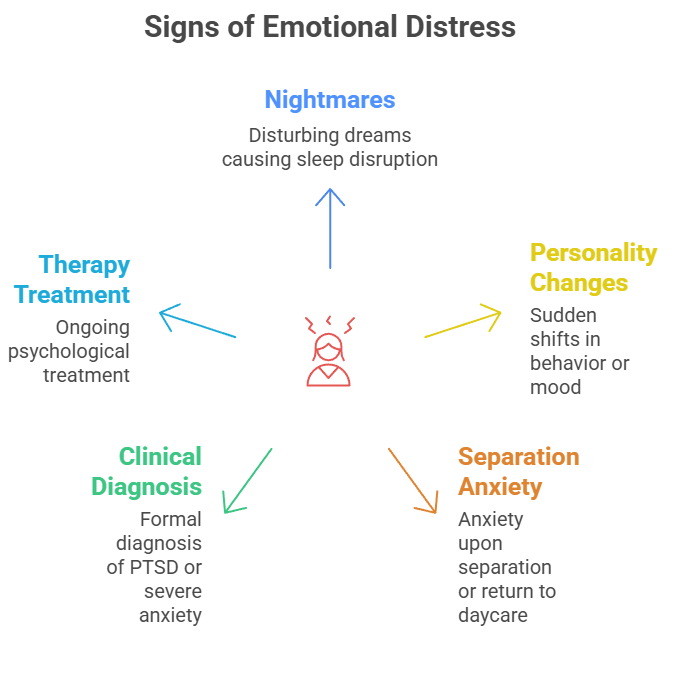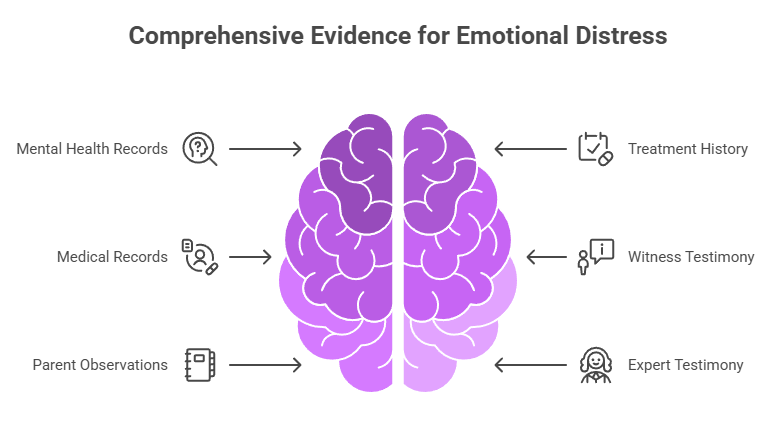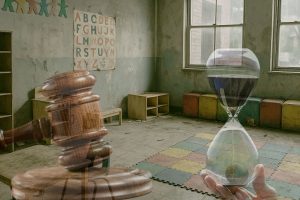Your Child Was Hurt at a Dallas Daycare – Can You Sue for Emotional Distress?
No parent sends their child to daycare expecting a call that something went wrong. When that call comes – when your child is injured under someone else’s care – the fear, anger, and heartbreak are immediate. But long after the physical wounds start to heal, the emotional damage can remain.
For parents in Dallas and across Texas, the law offers a path to justice not just for physical injuries, but also for the emotional trauma a child and their family may experience. Suing for emotional distress is possible in Texas, but it comes with strict requirements and legal hurdles.
This article breaks down when and how you may have a valid claim – and what Dallas families need to know when pursuing emotional damages after a daycare injury.
Understanding Emotional Distress in Legal Terms
Emotional distress is more than just feeling upset or shaken – it refers to serious psychological suffering caused by a traumatic experience. In legal cases, it’s considered a type of non-economic damage, meaning it doesn’t come with a direct bill like a medical expense but still affects quality of life.

Under Texas law, emotional distress can be part of a claim if it meets certain legal standards. That usually means showing the emotional harm was severe, ongoing, and directly linked to the daycare’s actions or negligence. In some cases, parents may also have their own claim if they witnessed the injury or its aftermath.
In Dallas courts and throughout Texas, the legal system recognizes emotional trauma – but it expects more than just verbal testimony or generalized worry. The emotional impact must be backed by proof that the child experienced measurable psychological harm.
Texas courts may consider signs like:
- Nightmares or sleep disturbances
- Sudden changes in personality or mood
- Anxiety triggered by separation or return to daycare
- A clinical diagnosis, such as PTSD or severe anxiety
- Extended therapy or psychological treatment
The stronger the documentation and expert input, the better your chances of having an emotional distress claim taken seriously.
What Counts as a Daycare Injury in Texas?
Not every incident at daycare rises to the level of a legal claim. But when an injury happens because a daycare facility in Texas fails to provide proper care, supervision, or safety, it may qualify as negligence – and open the door for legal action.
Under state law, all licensed childcare facilities in Texas are required to meet safety and staffing standards established by the Texas Health and Human Services Commission (HHSC). In Dallas, local inspectors and state agencies monitor compliance, but violations still happen.
Some common daycare injuries that may justify legal action include:
| Injury Type | Examples of Negligence |
|---|---|
| Falls | Unsecured playgrounds, slippery floors, lack of supervision |
| Burns | Hot bottles, uncovered outlets, unsafe kitchen areas |
| Choking incidents | Small objects, unsafe food, inadequate staff response |
| Physical or sexual abuse | Failure to screen employees, ignoring red flags |
| Head injuries | Unsupervised play, improper use of equipment |
To file a claim, the injury must typically be preventable – something that wouldn’t have happened if the daycare had met its obligations. For example, if a child was left unattended near a staircase or given food known to be a choking hazard, that could be considered negligent.
In Texas, including Dallas County, proving negligence usually requires showing:
- A duty of care existed (the daycare had a responsibility to protect the child)
- That duty was breached
- The breach caused the injury
Once physical injury is established, it may also support a claim for emotional distress – especially when the injury was traumatic or the emotional impact is severe and well-documented.
When Can You Sue for Emotional Distress in Texas?
Texas law allows emotional distress claims in limited situations, and those involving children at daycare often fall into complex legal territory. To sue for emotional distress, you typically need to meet one of two legal standards: negligent infliction of emotional distress or intentional infliction of emotional distress.
1. Negligent Infliction of Emotional Distress (NIED)
Texas does not generally recognize NIED as a stand-alone claim. But emotional damages can still be recovered if they stem from a physical injury, which is common in daycare injury cases. If your child suffered a physical injury and is now struggling emotionally, that emotional harm can be included as part of the damages.
Parents may also pursue emotional damages under what’s called a “bystander claim.” This applies when a parent:
- Witnesses the injury or its immediate aftermath
- Has a close relationship with the child (like a biological or legal parent)
- Experiences serious emotional harm as a result
So, if a Dallas parent arrives to find their child unconscious after choking, and that experience causes lasting trauma, they may have a valid claim.
2. Intentional Infliction of Emotional Distress (IIED)
This applies when the daycare or its staff acted outrageously or intentionally in a way that caused severe emotional harm. Examples include:
- Physical or sexual abuse
- Threatening behavior or deliberate cruelty
- Repeated bullying ignored by staff
This type of claim is difficult to prove and often requires strong supporting evidence – especially if no physical injury occurred.
Important: Texas courts apply a high standard for what qualifies as “severe” emotional distress. Temporary fear, frustration, or anger isn’t enough. The harm must be serious and have a lasting impact on the child’s mental health or daily life.
Evidence You Need to Prove Emotional Distress
In emotional distress claims, what you feel must be proven with what you can show. Especially in Texas – and particularly in cases involving children – courts expect real, detailed, and professional documentation of the emotional harm suffered.

This is often the most challenging part of the case. Emotional trauma isn’t always visible, and young children may struggle to express what they’re going through. That’s why parents in Dallas should begin documenting behavioral or emotional changes immediately after an incident.
Accepted forms of evidence may include:
- Mental health records: Diagnoses from psychologists, psychiatrists, or licensed therapists. These should indicate the nature and severity of the emotional condition (such as PTSD or anxiety).
- Treatment history: Evidence of consistent counseling or therapy sessions. The longer and more focused the treatment, the stronger the evidence.
- Medical records: Even if treatment was primarily physical, any mention of anxiety, behavioral regression, or fear of returning to daycare adds support.
- Witness testimony: Teachers, neighbors, or extended family members who can speak to behavioral changes.
- Parent observations: Daily logs tracking sleep, eating habits, separation anxiety, mood swings, or regressions (e.g., bedwetting, thumb-sucking).
- Expert testimony: A mental health professional hired as a legal expert to explain how the incident likely caused emotional trauma.
In Dallas child injury cases, lawyers often work with local child psychologists and pediatric trauma specialists to present clear, courtroom-appropriate explanations of the child’s emotional state.
Checklist: What to Start Collecting Immediately
- Copies of therapy or medical bills
- Session summaries from counselors
- A journal documenting your child’s behavior
- Photos, videos, or drawings that show distress
- Correspondence with the daycare after the incident
The earlier this process starts, the more credible your claim will be in court or settlement negotiations.
Special Challenges in Daycare Emotional Distress Cases
Emotional distress is already difficult to prove – but when the victim is a young child, the challenges multiply. In Texas daycare injury cases, the emotional toll on a child may be real and long-lasting, but proving it in court requires extra care and precision.
Why It’s Harder with Children
Young children often lack the vocabulary or self-awareness to describe what they’re feeling. That means parents, caregivers, and professionals must piece together the signs – behavioral changes, physical symptoms, emotional outbursts – and connect them to the incident at daycare.
In many Dallas cases, children who once enjoyed daycare may suddenly:
- Refuse to attend or become panicked when separated
- Have unexplained meltdowns or mood swings
- Exhibit regressive behaviors like thumb-sucking or bedwetting
- Struggle with nightmares or insomnia
Courts expect a clear timeline showing that these symptoms appeared after the injury and have persisted long enough to impact the child’s well-being.
Legal Procedures Involving Minors
Texas courts often take extra precautions when legal claims involve children. For emotional distress claims, this may include:
- Appointment of a guardian ad litem to represent the child’s best interests
- Separate claims filed on behalf of the child and the parent
- Oversight of any settlement to ensure funds are used for the child’s benefit
Parents in Dallas filing these claims should also prepare for a longer legal process. Emotional distress cases involving children often require expert evaluations, school and daycare records, and testimony from pediatric mental health professionals.
Pro tip: Start tracking emotional symptoms right away. Use a written or digital journal to note dates, triggers, and changes in routine or behavior. This log can later serve as informal evidence to support expert findings.
What Damages Can You Recover in These Cases?
In Texas daycare injury cases, damages aren’t limited to the cost of medical care. When a child suffers emotionally as a result of an injury, families may be entitled to additional compensation for that psychological harm – especially if it’s serious and long-lasting.
Types of Recoverable Damages
Economic Damages
These are direct, out-of-pocket costs related to the emotional trauma, such as:
- Counseling or therapy expenses
- Psychiatric evaluations
- Medication prescribed for emotional or behavioral conditions
Non-Economic Damages
These relate to the emotional experience itself. Texas law allows families to seek compensation for:
- Emotional suffering
- Mental anguish
- Loss of enjoyment of life
- Behavioral regression or developmental delays tied to trauma
These damages can be more difficult to quantify, which is why strong evidence is critical.
Punitive Damages
In rare and extreme cases – such as abuse or deliberate harm – a Texas court may award punitive damages. These are designed to punish the daycare provider and deter similar conduct in the future.
Limitations on Damages in Texas
Texas law places certain limits on non-economic damages, especially in claims involving public or government-funded daycare facilities. In some cases, caps may apply based on state tort reform laws.
In Dallas and surrounding areas, the nature of the daycare (private vs. public), the severity of harm, and the strength of your evidence will all influence what compensation may be available.
Scenario Example:
A Dallas child suffers a serious fall at daycare due to broken playground equipment. While physical injuries heal within weeks, the child develops panic attacks and can no longer attend any group childcare setting. With medical and psychological records showing PTSD and long-term therapy, the family may have a claim for both economic and non-economic damages.
When to Talk to a Texas Child Injury Attorney
If your child has been physically hurt and is now showing signs of emotional distress, speaking with an experienced child injury attorney in Dallas should be a priority. These cases can be complex – especially when emotional trauma is involved – and early legal action can make all the difference.
Why Timing Matters
Texas generally gives you two years from the date of injury to file a claim. But emotional distress may take weeks or months to appear. The sooner you consult an attorney, the sooner you can begin collecting evidence, consulting medical experts, and protecting your child’s legal rights.
Waiting too long can lead to:
- Loss of critical evidence
- Memory fade among witnesses
- Gaps in documentation that weaken your case
What a Dallas Child Injury Lawyer Can Do
A qualified attorney will:
- Evaluate whether you have a valid emotional distress claim
- Help you gather medical and psychological records
- Work with local child trauma experts to support your case
- Handle communication with the daycare and their insurance provider
- Represent your family in court or during settlement negotiations
At Genthe Law Firm in Dallas, we help families navigate the emotional and legal challenges that follow serious daycare injuries. From the first consultation to final resolution, your child’s well-being is our top concern.
FAQs about Daycare Injuries and Emotional Distress in Texas
Can I sue a daycare in Dallas for emotional distress if my child wasn’t physically hurt?
Possibly – but it’s much harder. Texas courts generally require some form of physical injury or outrageous conduct (like abuse) to support an emotional distress claim.
What is considered “severe” emotional distress in a legal case?
Symptoms like ongoing nightmares, separation anxiety, PTSD diagnoses, or significant behavioral regression may qualify if they can be clearly linked to the daycare incident.
Do I need expert witnesses to prove my child’s emotional trauma?
In most cases, yes. Courts in Texas often expect licensed therapists or psychologists to document and testify about the child’s emotional condition.
How long do I have to file a daycare injury claim in Texas?
You generally have two years from the date of the injury. However, because children are involved, some exceptions may apply. A Dallas child injury lawyer can confirm your specific timeline.
Can I recover damages for missed work or emotional trauma as a parent?
If you witnessed the injury or were directly affected by it, you may have your own claim for emotional distress under Texas’s bystander rule.
Is the daycare’s insurance required to cover emotional harm?
Not automatically. Most policies cover physical injury first. Emotional damages often require a legal battle backed by strong documentation and expert support.
What if the daycare is owned by a church or nonprofit in Dallas?
Claims against certain religious or nonprofit daycare providers may be subject to additional legal protections. An attorney familiar with Dallas law can help you navigate those nuances.
Does the state of Texas inspect daycare facilities regularly?
Yes. The Texas HHSC inspects and licenses childcare providers, including those in Dallas. Violations can be public record – and useful in your case.
Will my child have to testify?
Usually not. In most cases, attorneys work with mental health experts, teachers, and parents to build the case without putting the child on the witness stand.
How much is a typical emotional distress settlement for a daycare injury?
Amounts vary widely depending on the severity of the injury, strength of evidence, and emotional impact. Only a detailed case review can give an accurate estimate.
Contact a Dallas Child Injury Lawyer Today
If your child has suffered emotional or physical harm at a daycare facility, don’t wait to take action. The sooner you understand your rights, the sooner you can protect your child’s future.
Genthe Law Firm is based in Dallas and serves families across Texas. We have extensive experience with child injury cases and understand the emotional weight these claims carry. Let us help you pursue the justice and compensation your family deserves.
Call us today at 214-957-0898 for a free consultation.
Page Contents
- Your Child Was Hurt at a Dallas Daycare – Can You Sue for Emotional Distress?
- Understanding Emotional Distress in Legal Terms
- What Counts as a Daycare Injury in Texas?
- When Can You Sue for Emotional Distress in Texas?
- Evidence You Need to Prove Emotional Distress
- Special Challenges in Daycare Emotional Distress Cases
- What Damages Can You Recover in These Cases?
- When to Talk to a Texas Child Injury Attorney
- FAQs about Daycare Injuries and Emotional Distress in Texas
- Contact a Dallas Child Injury Lawyer Today



